- Home
- J. Clifton Slater
Death Caller (Clay Warrior Stories Book 13) Page 4
Death Caller (Clay Warrior Stories Book 13) Read online
Page 4
“Most men earning a living by the load,” another commented, “don’t linger over a leisurely breakfast.”
“Not to be insulting,” Alerio observed. He shifted his feet and bent his legs in case they took offense. “You seem to be honoring Aergia.”
Rather than anger, the mention of the Goddess of Laziness and Sloth brought laughter from the men.
“We work for Tristis,” the third porter told Alerio. “He pays good and requires we be available when he needs us.”
“I’d like to work for him,” Alerio stated.
“You don’t apply to Tristis,” the man with the burn scar informed him. “The broker finds you.”
“How does that work?” Alerio asked.
“We were struggling until he pulled us from hauling fish heads and manure,” the second porter exclaimed. “Now we haul ingot iron and crates. But like he said. You do not find Tristis. Tristis finds you.”
Alerio spun and walked to the entrance. In his mind he turned over the information. There was a universal truth in what the teamsters said. Desperate men will do anything to improve their lot. And a despicable agent could entice them with coins to do his bidding.
The sausage in Alerio’s stomach soured because this meant Tribune Sisera had to become desperate. Alerio climbed on his cart and turned the horse down a side street. He had one stop to make before heading to the beach to join the ranks of desperate, dirty, and smelly teamsters.
***
Households had casks of it in storage, businesses stocked barrels of it, and ship’s cargo holds were filled with amphorae of the liquid. But few porters, or single men or women, purchased a cask full of vinegar.
“It’s good for digestion and to wash wounds,” the seller instructed.
“Good to know,” Alerio replied as he placed the container in the center of the storage box. Then to himself, he mumbled. “And excellent for scrubbing garbage and filth out of carts.”
With the vinegar stored, he flicked the reins, and the mare pulled the rig towards the beach.
Chapter 6 – Haul from the Sea
The horse dropped down a ramp and struggled to pull the cart across the soft dirt. As they neared the water, the gravel and packed sand provided better footing. While moving towards the fish racks, Alerio counted Republic warships. There were two squadrons on the beach, but fewer than half the six thousand oarsmen needed for twenty warships. Hopefully, without the extra rowers to feed, the fishermen would have surplus catch to ship to inland towns.
Ahead he could see three stooped men with worn out horses and badly repaired carts. Here were the desperate teamsters he needed to join.
Higher on the beach, men dumped the morning’s haul from the sea on tarps. From the location beside the hot embers under the drying racks, men sorted the fish. Big and medium fish were held for direct selling while the small fish were placed on the drying racks.
“Master fisherman,” Alerio called to the group of men tending the fish and fires. “Have you a load for the road?”
“I do. Several in fact,” one replied. He separated from the others and approached Alerio. “But before I can load carts, I need salt. You ride and get me sacks of salt and I’ll hire you to carry a load of dried and fresh fish.”
“What does it pay?” Alerio asked.
“It’s only a mile and a half to the marshes,” the Master of the Catch answered. “I don’t pay for hauling preservatives you need to transport fish. You want the job, or not?”
Even as Hamus’ advice to always work for a minimum of two bronze per mile went through his mind, Alerio nodded his agreement.
“I don’t have the coins to purchase the salt,” he admitted.
“Do you have all of your fingers and toes?” the fisherman questioned.
“I do,” Alerio replied.
The Master of the Catch handed Alerio a slip of paper.
“Give this to the warehouse foreman. It is a voucher for fifteen sacks. I expect you to return with a count the same as toes on both feet and fingers on one hand.”
In reply, Alerio took the piece of paper. Then he wiggled his toes as if he had no grasp of numbers and finished by jiggling the fingers on one hand.
“I understand,” Alero told the Master of the Catch.
Turning the mare, Alerio headed the rig along the beach in the direction of the salt marshes.
***
The route took Alerio from the sand to the ground along the piers. On the seaward side, merchant transports unloaded grain and goods for the fleet and Ostia’s Legion post. Teamsters, all well fed with good rigs and healthy animals, hauled the cargo away from the docks. They were Tristis’ porters, Alerio had no doubt.
Opposite from the docks, the fortified naval buildings with the reinforced roofs and the bolt throwers stood sentinel over the approach to the Tiber river. Beyond the structures of the pier and the buildings, a raised pathway trekked inland and deeper into the marshes.
A series of square ponds stretched out along the sides of the path. Although ponds might have been giving the shallow basins too much credit. The largest in area and closest to the beach contained maybe a hand’s width of seawater.
After baking in the sun and wind, the brackish water drained via two trenches into more shallow basins. At these, laborers raked the surface pulling algae and seaweed from the top of the thumb deep water.
Next in the series were even smaller basins. In these, laborers pulled boards mounted at the end of long poles. The boards parted the thin film of water while scraping up white granules of salt.
Along the edges of the ponds, the salt piled up and was left to dry in the sun. From mounds sufficiently dried, men with buckets collected the salt.
Using the land between ponds for footpaths, they carried the buckets of sea salt to a warehouse. Alerio followed the harvesters to the same building.
***
“I have a voucher from the Master of the Catch,” Alerio informed a man standing at the entrance. He looked at the number before passing over the slip of paper.
The warehouse worker took the voucher, glanced at it briefly, and inquired, “How many sacks?”
“Do you want that in fingers and toes?” Alerio replied.
“Fifteen sacks it is,” the warehouseman declared. “Wait here…”
“Hold up,” Alerio ordered. “Read the number again. I believe you’ll find it’s for seventeen bags of salt.”
The man bristled as if indignant about something. He studied the chit and finally acknowledged the number.
“Seventeen sacks of salt,” he confirmed. “Wait here while I get them.”
“In honor of Salacia, leave the paper with me,” Alerio instructed.
“What does the Goddess of Seawater and Patience have to do with this?” the worker questioned. He waved the voucher in a dismissive manner as if the page held no significance.
“As I explained to the Master of the Catch,” Alerio told him. “I don’t have the coins to buy any missing salt. If there is any confusion in the count, you’ll quickly grow to appreciate the calm of the Goddess Salacia.”
Cheating illiterate porters must be a business deal between the Master of the Catch and the manager of the salt warehouse. When Alerio challenged the count, he noticed the salt merchant flinch. Even though caught, there was no way of him backing out of the sale.
“I get your meaning,” the warehouse worker responded. He passed the chit to Alerio and vanished into the building.
Alerio followed but stopped inside the doorway. Resembling stalls for horses, the warehouse was divided into kiosks. In some areas, the salt was as light as fine sand. In those booths, men used scoops to fill bags. In other stalls, bulky crystals of salt were beaten by wooden mallets until they were coarse granules. The rest of the booths had salt in consistencies somewhere between the two.
After sniffing the air, Alerio’s nose burned from the salt dust. He stepped outside and marveled at the difference. Sea scented air was refreshing while the wareho
use air burned the back of his throat and made his tongue dry.
“It’s so odd,” he pondered. “We use gifts from Tellus and process the raw materials. Then afterwards, the gifts from the Goddess of the Earth become irritating.”
He was thinking of the salt dust, the wasting of lead workers, and the sharp unpleasant aroma from the tanning process. A line of men came from the warehouse carrying bags of salt.
“And then there is the fruit of the vine,” he considered while strolling to his rig. “Processing grapes certainly creates a more pleasant product then mere fruit.”
At the cart, he placed all seventeen sacks of salt evenly on the bed. When loaded, he handed the warehouseman the voucher and guided the mare back to the raised pathway.
“Then there is cheese,” he mentioned to the horse as they rode by the seawater drying basins. “A product far superior to milk in taste. Plus, cheese last much longer.”
***
“Let me count,” the Master of the Catch stated. He ran his eyes over the load of salt. Then with a roar, he announced. “There are two missing. I only see fifteen. The loss of two salt bags is coming out of your commission.”
The way Alerio stacked the bags, there was no way of counting the salt containers without unstacking them.
“But you said fifteen,” Alerio protested. He held up a foot and pointed at his toes. “Remember, ten toes and five fingers means fifteen.”
“You either didn’t count at the warehouse, because you weren’t listening,” the Master accused. “Or you stole the two bags of salt.”
“But I need the work,” Alerio protested. “Why would I ruin my chances? I swear, I did not take the salt.”
The Master of the Catch pulled bags from Alerio’s cart and distributed fourteen to the other teamsters.
“I’ll leave you one sack,” he said while peering up at the sun. “It’s barely enough to cover the load. It is only five miles to Infernetto. If you hurry, you might get there before the fish rot. Oh, and the load pays one bronze one way. Payable when you get back. Take it or leave it.”
“I’ll take the contract,” Alerio agreed, as would any desperate teamster.
Fishermen strolled over and flopped the lease valuable of the day’s catch onto the cart. Alerio reached in, shuffled, and adjusted the load while sprinkling salt over each layer. In the hot sun, with little salt, it would take an intervention from the God Mercury, the swift messenger of the Gods, to arrive in Infernetto with the load of fish unspoiled.
The other three porters had already departed.
“You picked on me because I was new,” Alerio ventured.
He stood by the cart looking at the master’s face seeking any sign of remorse or humanity.
“I don’t know what you are talking about,” the Master of the Catch responded. Then with an evil grin, he added. “You better get going. I believe your load is starting to smell, already.”
Alerio climbed in among the fish and snapped the reigns. The horse pulled and the cart rolled, leaving ruts in the hard-packed shoreline. Near the docks, he guided the horse onto the road and the mare picked up the pace.
At the crossroads and the turn off to the town of Ostia, Alerio eased the mare to the side of the road.
“You can’t cheat an honest man,” Alerio told the horse.
From the storage box, he pulled the two missing bags of salt and packed the granules over the fish creating a shell. With the minerals protecting the fresh fish, he climbed onto the cart and snapped the reins.
“I wonder what the citizens of Infernetto did to the Master of the Catch,” Alerio said to the mare. “It must have been bad for him to want them to receive a load of rotting fish.”
A few paces later, Alerio laughed, clawed a handful of salt up in his hand, and tossed it over his shoulder.
“But this time, the fish will arrive fresh,” Alerio exclaimed. “I wonder how the town will respond to that?”
Chapter 7 - Infernetto
Two and a half miles from Ostia, Alerio reined in the mare. After tying a line to a tree branch, he walked to the bank of a water course. Although wide, it didn’t seem deep. But those were not the features worrying him. Splashing and stomping across, he checked the bed of the stream to be sure his cart could traverse the creek. Many a Legion had been delayed when their supply wagons bogged down in a soft clay bottom or had wheels broken on submerged rocks.
“The bottom is good,” Alerio informed the mare. He pulled the line and urged the horse down the embankment and into the water. Pausing, he allowed the horse to drink before nudging her forward.
“See, not too deep and the bottom is firm.”
Alerio and the rig climbed the far bank. On the other side of the creek, they entered a section of the road with trees on both sides. Deeper into the forest, the road, for no apparent reason, began turning back on itself in a series of switchbacks. Usually, a road with that many curves was the result of terrain. There did not seem to be any reason for the curved design on the miles before Infernetto.
***
The hamlet of Infernetto occupied the corners of a crossroad. Alerio studied the intersection trying to decide which of the roads was more twisted. As the horse neared an open area, he discovered that, like the bent roads, the town square lacked straight edges. The green space was oblong shaped.
“Is there nothing square in this place?” Alerio asked the horse.
Guiding the rig off the curved road, he pulled it to a stop on the edge of the town’s green.
“Fresh fish,” he announced to passing citizens.
A few walked over.
“The last three loads from Ostia were spoiled,” a woman complained.
“These are fresh catch and come with a scoop of salt,” Alerio pointed out. “Fresh fish!”
Even if they did not want the fish, a scoop of salt more than offset the cost of an individual fish. With the bonus of sea salt, Alerio easily sold a third of his load. A coin count showed he had already recouped the cost of the fish and his transportation fee.
The rest of the profit would be a test of character. Or rather, a test of what would separate him from the other desperate teamsters and get him noticed. Keep the extra coins or turn them over to the Master of the Catch?
“You there, stop your selling,” a man followed by a man-at-arms shouted.
Their general direction was towards Alerio but the path they walked weaved along the edge of the grassy area.
“Is there a problem?” Alerio questioned.
“Bring your cart over here and I will buy all of your fish,” the man promised.
Over here was about ten steps from the rig. Certainly not a great hike for the man and his bodyguard.
“Why don’t you come over here?” Alerio inquired.
From behind Alerio a voice boomed, “Because then, they would be on Curiatii land.”
“Ignore him and bring your fish over to Horatii property,” the first man encouraged.
Sensing he was in the middle of an ancient quarrel, Alerio urged the horse forward until the cart straddled the wandering property line.
***
The noble from Horatii followed and a few steps later, the Curiatii gentleman reach the rig. The nobles, as Alerio could tell by their expensive tunics and their bodyguards, stood glaring at each other over the cart and the salted fish.
“I’ll buy this side of the load,” the Curiatii man declared.
“And I’ll take the fish from my side,” the other nobleman exclaimed.
Both men sent for servants to carry away their purchases. While they waited, Alerio inquired, “Why are the boundaries zigzagged? It must require regular sacrifices to Terminus to maintain the lines.”
“More than offerings to the God of Boundary Markers,” the Horatii Lord stated.
“Sacrifices and steel are both required to keep the peace,” the Curiatii noble confirmed.
“How did you come to live with wavy property lines?” Alerio inquired.
“W
hen King Hostilius ruled the Kingdom of Rome, the subjects lived in fear of the Sabines,” Master Horatii explained. “But a dispute with neighboring Alba Longa threatened war. Fearing that fighting would weaken both cities and create opportunity for the Sabines, the rulers decided to select champions.”
“Three Curiatii brothers stepped between the battle lines to face the Horatii brothers from Rome,” Master Curiatii described. “The armies watched as the six men fought. After much slashing and bashing, two of the Horatii trio lay dead. Although the Curiatii siblings were wounded, they stalked towards Publius the last Roman champion.”
“Publius Horatii ran. As he sprinted between the battle lines, the Romans feared he suffered from cowardice,” the Horatii Lord told Alerio. “But his run spread out the Curiatii siblings. Once a gap opened, Publius turned about and slew the least injured. Then following the meandering trail of blood, he engaged the second wounded brother. After defeating that one, he again followed the staggered trail of blood drops.”
“Publius Horatii, curse his name, reached the most injured of the Curiatii brothers and murdered him,” Master Curiatii illustrated by indicating the erratic property line. “To honor Terminus, our ancestors used the blood markings as the boundary between our two peoples. Now we are citizens of the Republic, but we keep the old ways.”
“And old feuds, it seems,” Alerio observed. Then he suggested. “We should discuss prices for the fish and salt.”
“Name your price,” the Curiatii noble responded. “If it’s fair, I’ll pay.”
“You seem to be an honest man,” the Horatii gentleman professed. “Prove it.”
Until then, Alerio had been relaxed. But the easy way they agreed to his setting the price unnerved him.
Men and women arrived and as fish and scoops of salt were removed from the cart, Alerio collected coins. First from Horatii servants, then from Curiatii servants. And while he gathered payments, he observed something else. Everyone was armed with a blade, long steel for the men and short knives for the women.
The piles of bronze coins grew taller. They became a focus of attention for the domestics as they stacked fish on woven trays and clutched cups of salt. Their attentiveness to the money made Alerio anxious and he covered the stacks with his hat.

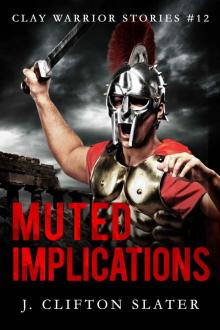 Muted Implications (Clay Warrior Stories Book 12)
Muted Implications (Clay Warrior Stories Book 12)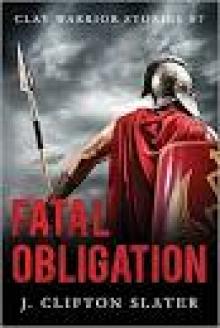 Fatal Obligation
Fatal Obligation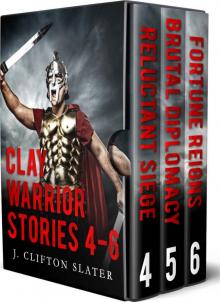 Clay Warrior Stories Boxset 2
Clay Warrior Stories Boxset 2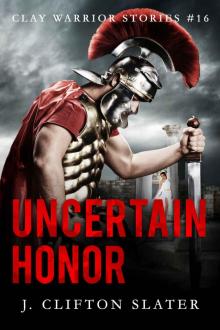 Uncertain Honor
Uncertain Honor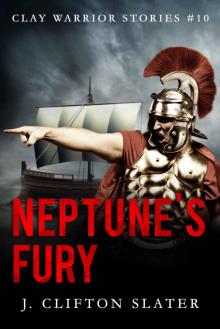 Neptune's Fury
Neptune's Fury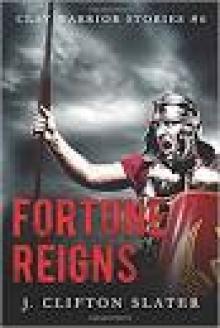 Fortune Reigns
Fortune Reigns Op File Treason
Op File Treason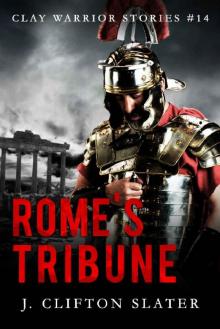 Rome's Tribune (Clay Warrior Stories Book 14)
Rome's Tribune (Clay Warrior Stories Book 14)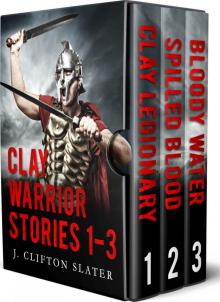 Clay Warrior Stories Boxset 1
Clay Warrior Stories Boxset 1 Serpent Circles
Serpent Circles Reluctant Siege
Reluctant Siege Infinite Courage
Infinite Courage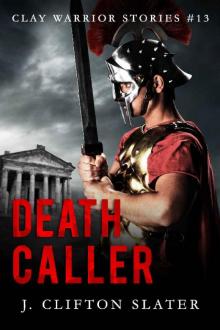 Death Caller (Clay Warrior Stories Book 13)
Death Caller (Clay Warrior Stories Book 13) Op File Sanction
Op File Sanction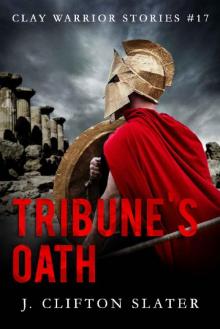 Tribune's Oath (Clay Warrior Stories Book 17)
Tribune's Oath (Clay Warrior Stories Book 17) Galactic Council Realm 1: On Station
Galactic Council Realm 1: On Station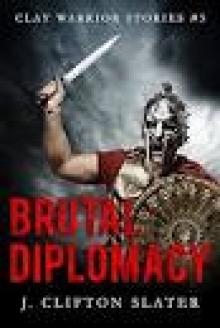 Brutal Diplomacy
Brutal Diplomacy Op File Revenge
Op File Revenge On Point
On Point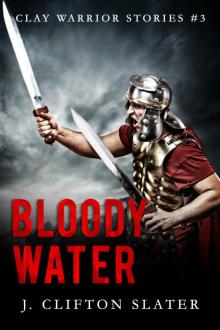 Bloody Water (Clay Warrior Stories Book 3)
Bloody Water (Clay Warrior Stories Book 3)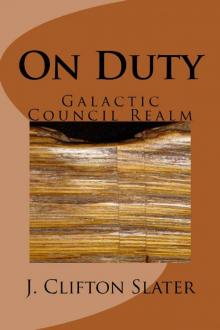 Galactic Council Realm 2: On Duty
Galactic Council Realm 2: On Duty Galactic Council Realm 3: On Guard
Galactic Council Realm 3: On Guard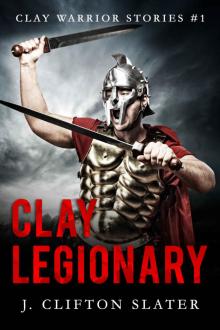 Clay Legionary (Clay Warrior Stories Book 1)
Clay Legionary (Clay Warrior Stories Book 1) On Point (Galactic Council Realm Book 4)
On Point (Galactic Council Realm Book 4) Op File Revenge (Call Sign Warlock Book 1)
Op File Revenge (Call Sign Warlock Book 1)